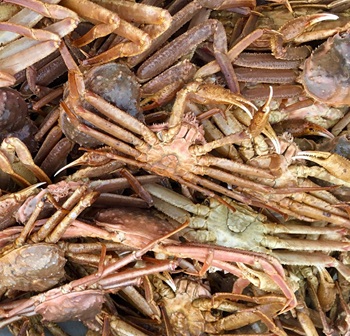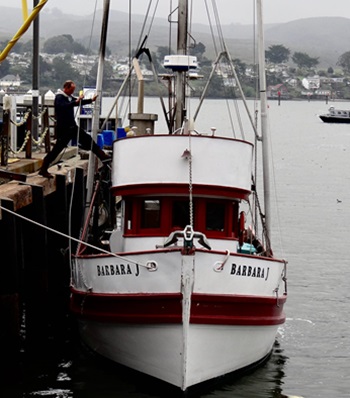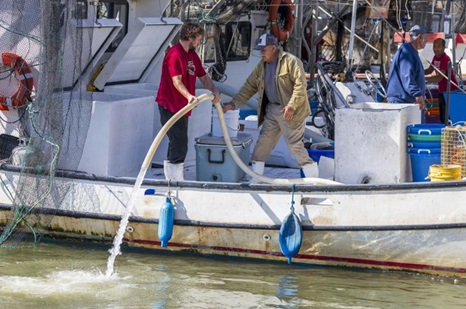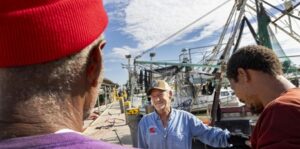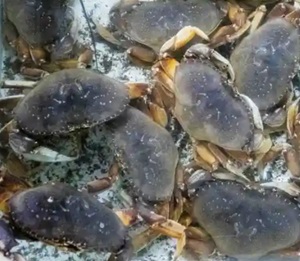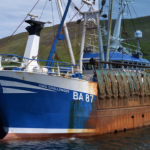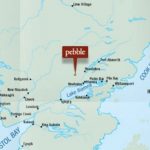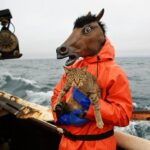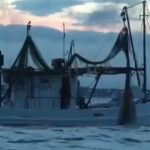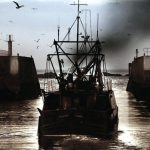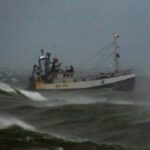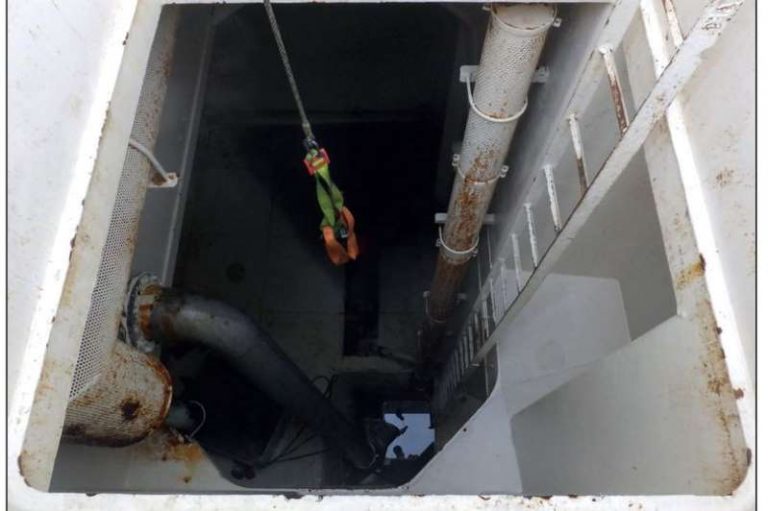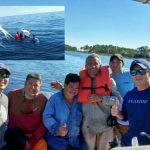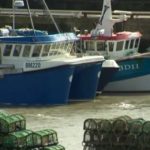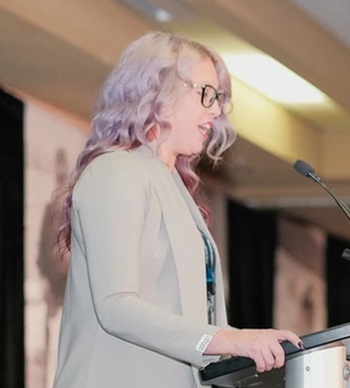 It’s good to know it’s there if needed, but neither Newfoundland and Labrador’s unionized fishery workers, nor the processors they sell to or work for, want to see the industry disrupted by organized labour strife. On Dec. 4, the provincial government made amendments to the Fishing Industry Collective Bargaining Act that will make it easier for the members of FFAW-Unifor, which represents both fish harvesters and plant workers, to take strike action, or for the members of the Association of Seafood Producers (ASP) to lock them out if they cannot agree on fish prices. The amendments were read for a third time in the House of Assembly, but Royal Assent has been deferred until the two sides indicate they wish to reclaim their constitutional rights to strike or lockout. more, >>CLICK TO READ<< 10:53
It’s good to know it’s there if needed, but neither Newfoundland and Labrador’s unionized fishery workers, nor the processors they sell to or work for, want to see the industry disrupted by organized labour strife. On Dec. 4, the provincial government made amendments to the Fishing Industry Collective Bargaining Act that will make it easier for the members of FFAW-Unifor, which represents both fish harvesters and plant workers, to take strike action, or for the members of the Association of Seafood Producers (ASP) to lock them out if they cannot agree on fish prices. The amendments were read for a third time in the House of Assembly, but Royal Assent has been deferred until the two sides indicate they wish to reclaim their constitutional rights to strike or lockout. more, >>CLICK TO READ<< 10:53Tag Archives: commercial fishing
From fish traps to factory trawlers — A ‘back to the future’ look at Seattle’s fishing industry
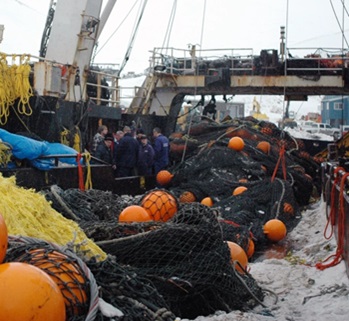 An advertiser-sponsored article in the Seattle Times gushed “Wild Alaska pollock’s fishing fleet is based right here in Seattle although all of the fish are caught in U.S. waters off of the coast of Alaska. This fishery benefits the economic growth of the entire region, including the North Pacific Fishing Fleet.” That includes 300 commercial fishing vessels of which 226 fish in Alaska. Many of the boats are huge catcher-processors — factory trawlers — that target pollock, cod, rockfish, flounders and other “groundfish” species. Alaska pollock alone is a 3 billion-pound fishery worth roughly $2 billion. And every year, the Seattle trawlers take home up to 76% of the value of ALL groundfish caught in the Bering Sea and Gulf of Alaska. It’s not a new scenario. Starting in 1885 and until Alaska became a state in 1959, Seattle companies used big traps to catch salmon throughout the territory. more, >>CLICK TO READ<< 10:55 By Laine Welch
An advertiser-sponsored article in the Seattle Times gushed “Wild Alaska pollock’s fishing fleet is based right here in Seattle although all of the fish are caught in U.S. waters off of the coast of Alaska. This fishery benefits the economic growth of the entire region, including the North Pacific Fishing Fleet.” That includes 300 commercial fishing vessels of which 226 fish in Alaska. Many of the boats are huge catcher-processors — factory trawlers — that target pollock, cod, rockfish, flounders and other “groundfish” species. Alaska pollock alone is a 3 billion-pound fishery worth roughly $2 billion. And every year, the Seattle trawlers take home up to 76% of the value of ALL groundfish caught in the Bering Sea and Gulf of Alaska. It’s not a new scenario. Starting in 1885 and until Alaska became a state in 1959, Seattle companies used big traps to catch salmon throughout the territory. more, >>CLICK TO READ<< 10:55 By Laine Welch
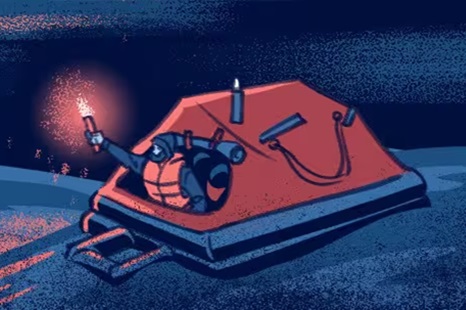
Lost at Sea
When a group of seven fishermen went missing off the northeast coast of Newfoundland in July, the small community of New-Wes-Valley was gripped with dread. Coast Guard captain Colin Roul describes the waters around Newfoundland and Labrador as dangerous and unforgiving. “Usually, when you hear distress situations like this, where no sign or sound was heard from these guys, yeah, the outcome is bleak,” he said. As 24 hours turned to 36, then 48, not much hope remained. “We knew this was going to be a regional funeral,” said Michael Tiller, mayor of New-Wes-Valley, where five of the seven men were from. “The food was ready. The place was booked. We were ready to help this town go through one of the worst disasters that it could ever go through. “But then, news of the nearly impossible — the men were found in a raft about 270 kilometres from shore. Photos, more, >>CLICK TO READ<< 07:43
F/V Elite Navigator, 10 posts, >>CLICK TO READ<<
‘We Need Our Docks!’: Shrimpers’ plea as county reconsiders lease
 The Trico shrimp docks on San Carlos Island remain abandoned, damaged, and tangled in a growing dispute over their future. These docks once served as a vital unloading point for pink Gulf shrimp, supporting the livelihoods of hundreds of people in Fort Myers Beach. Now, the area’s shrimping industry faces an uncertain path forward. “Well, we don’t have any place to dock or unload right now,” said Dennis Henderson, President of Trico Shrimp Company, recalling a time when the docks bustled with activity. Without access to these docks, however, the entire industry could shrink drastically. Video, photos, more, >>CLICK TO READ<< 14:41
The Trico shrimp docks on San Carlos Island remain abandoned, damaged, and tangled in a growing dispute over their future. These docks once served as a vital unloading point for pink Gulf shrimp, supporting the livelihoods of hundreds of people in Fort Myers Beach. Now, the area’s shrimping industry faces an uncertain path forward. “Well, we don’t have any place to dock or unload right now,” said Dennis Henderson, President of Trico Shrimp Company, recalling a time when the docks bustled with activity. Without access to these docks, however, the entire industry could shrink drastically. Video, photos, more, >>CLICK TO READ<< 14:41
‘Tariffs not enough’ to save U.S. shrimping industry
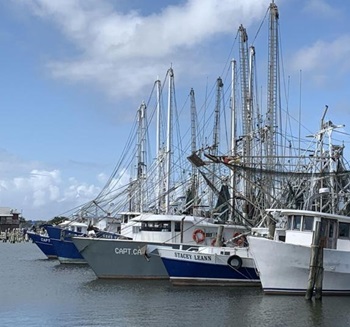 Alan Gibson, president of Tideland Seafood, summed up the frustration at a recent Louisiana Shrimp Task Force hearing in Houma. “Tariffs aren’t enough,” Gibson said. “The decrease in import prices is because of oversupply. They’re competing against each other to sell market share, and we’re fighting them, who are fighting each other.” Gibson called for a 25% import quota, saying it could reduce foreign competition enough to restore balance to the market. David Chauvin, a Louisiana-based seafood company owner, highlighted the disparity. Unlike tariffs, quotas directly limit the volume of imports, addressing the core issue of oversupply. By restricting imports, a quota could help stabilize domestic shrimp prices, allowing U.S. producers to compete more effectively. more, >>CLICK TO READ<< 16:58
Alan Gibson, president of Tideland Seafood, summed up the frustration at a recent Louisiana Shrimp Task Force hearing in Houma. “Tariffs aren’t enough,” Gibson said. “The decrease in import prices is because of oversupply. They’re competing against each other to sell market share, and we’re fighting them, who are fighting each other.” Gibson called for a 25% import quota, saying it could reduce foreign competition enough to restore balance to the market. David Chauvin, a Louisiana-based seafood company owner, highlighted the disparity. Unlike tariffs, quotas directly limit the volume of imports, addressing the core issue of oversupply. By restricting imports, a quota could help stabilize domestic shrimp prices, allowing U.S. producers to compete more effectively. more, >>CLICK TO READ<< 16:58
My Reason for Leaving Northeast Trawl Advisory Panel – Captain Sam Novello
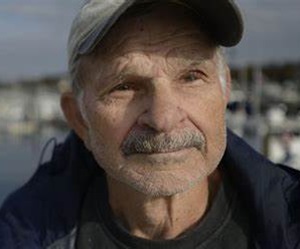 I was asked to join the NTAP (Northeast Trawl Advisory Panel) by NEFMC and I did because I believed could help, because I am quite knowledgeable about fishing and how to get fishing gear to fish properly. In the year 2000, I was on the spring survey of the R/V Albatross, and I was told by some of the crew who were x-commercial fishermen, that when the net was hauled you would not like the results. (so true) At that time, my vessel which was a side-trawler was using 60-80 net as the Albatross was using. My thoughts were, we have a catching problem here, on the Albatross. more, >>CLICK TO READ<< 06:37
I was asked to join the NTAP (Northeast Trawl Advisory Panel) by NEFMC and I did because I believed could help, because I am quite knowledgeable about fishing and how to get fishing gear to fish properly. In the year 2000, I was on the spring survey of the R/V Albatross, and I was told by some of the crew who were x-commercial fishermen, that when the net was hauled you would not like the results. (so true) At that time, my vessel which was a side-trawler was using 60-80 net as the Albatross was using. My thoughts were, we have a catching problem here, on the Albatross. more, >>CLICK TO READ<< 06:37
Gear tampering becoming more frequent in Gulf region, says DFO — and that means more ghost gear
 Gear tampering in the Gulf of St. Lawrence region off P.E.I. is more common than it used to be, according to the Department of Fisheries and Oceans, and the environmental cost can be high. “Gear tampering is any action that interferes or disrupts a legal fishery,” said Matthew MacEwen, the detachment supervisor in Charlottetown for Conservation Protection with Fisheries and Oceans Canada. “Examples of this could be tampering with traps, nets or lines… causing damage to that fishing gear that renders them incapable of doing their job fishing.” MacEwen said it could include cutting the ropes off traps, making them unretrievable, or bringing traps up from the waters and destroying the webbing and mesh that keep lobsters inside once they enter the traps. Video, photos, more, >>CLICK TO READ<< 06:26
Gear tampering in the Gulf of St. Lawrence region off P.E.I. is more common than it used to be, according to the Department of Fisheries and Oceans, and the environmental cost can be high. “Gear tampering is any action that interferes or disrupts a legal fishery,” said Matthew MacEwen, the detachment supervisor in Charlottetown for Conservation Protection with Fisheries and Oceans Canada. “Examples of this could be tampering with traps, nets or lines… causing damage to that fishing gear that renders them incapable of doing their job fishing.” MacEwen said it could include cutting the ropes off traps, making them unretrievable, or bringing traps up from the waters and destroying the webbing and mesh that keep lobsters inside once they enter the traps. Video, photos, more, >>CLICK TO READ<< 06:26
Researcher urges caution on rock lobster catch limit increase
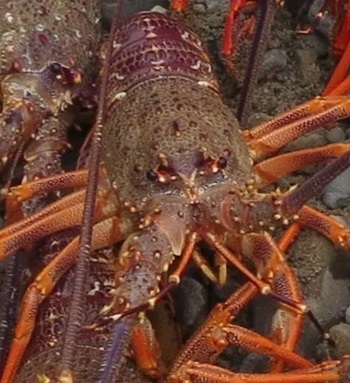 Seafood industry players say they will welcome an increase in catch limits for rock lobster and Pacific bluefin tuna if a proposal by the Oceans and Fisheries Minister gets the green light. However, a researcher is warning that increasing catch limits for rock lobsters is too risky. Oceans and Fisheries Minister Shane Jones has reviewed catch limits for spiny red rock lobster in the Hauraki Gulf, Coromandel and Bay of Plenty region, known as CRA 2, as well as Otago or CRA 7, and for Pacific bluefin tuna in TOR 1 (all of New Zealand). Consultation opened on Friday. The rock lobster fisheries were valuable for the economy and culturally, Jones said. “The fisheries provide jobs, bring significant export income for New Zealand, and are popular with recreational fishers. It’s important that we strike the right balance between getting the most value possible from these fisheries while ensuring their sustainability. This is reflected in the proposals.” more, >>CLICK TO READ<< 13:52
Seafood industry players say they will welcome an increase in catch limits for rock lobster and Pacific bluefin tuna if a proposal by the Oceans and Fisheries Minister gets the green light. However, a researcher is warning that increasing catch limits for rock lobsters is too risky. Oceans and Fisheries Minister Shane Jones has reviewed catch limits for spiny red rock lobster in the Hauraki Gulf, Coromandel and Bay of Plenty region, known as CRA 2, as well as Otago or CRA 7, and for Pacific bluefin tuna in TOR 1 (all of New Zealand). Consultation opened on Friday. The rock lobster fisheries were valuable for the economy and culturally, Jones said. “The fisheries provide jobs, bring significant export income for New Zealand, and are popular with recreational fishers. It’s important that we strike the right balance between getting the most value possible from these fisheries while ensuring their sustainability. This is reflected in the proposals.” more, >>CLICK TO READ<< 13:52
Moratorium on fishing Maine shrimp to continue through 2025
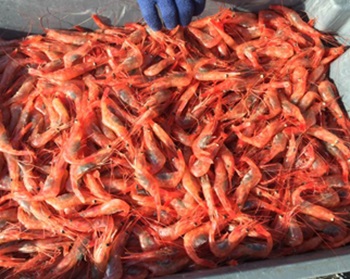 The Atlantic States Marine Fisheries Commission’s Northern Shrimp Section is maintaining the current moratorium on northern shrimp fishing through the 2025 fishing year. That makes 11 years of no commercial shrimp fishing in Maine. That action followed the 2024 Stock Assessment Update, “which indicates the northern shrimp stock has been at low levels of biomass for over the past decade despite the fishery being under a moratorium since 2014,” said the Atlantic States Marine Fisheries Commission in a Dec. 13 news release. The Update found no improvement in stock status and 2023 summer survey indices of abundance, biomass, and recruitment were the lowest in the 1984-2023 time-series. more, >>CLICK TO READ<< 07:32
The Atlantic States Marine Fisheries Commission’s Northern Shrimp Section is maintaining the current moratorium on northern shrimp fishing through the 2025 fishing year. That makes 11 years of no commercial shrimp fishing in Maine. That action followed the 2024 Stock Assessment Update, “which indicates the northern shrimp stock has been at low levels of biomass for over the past decade despite the fishery being under a moratorium since 2014,” said the Atlantic States Marine Fisheries Commission in a Dec. 13 news release. The Update found no improvement in stock status and 2023 summer survey indices of abundance, biomass, and recruitment were the lowest in the 1984-2023 time-series. more, >>CLICK TO READ<< 07:32
A Rebuttal to a Recent Commentary: Alaska trawl fisheries are vital and under attack by those using myths
 This campaign to ban trawling – a sustainable fishing method responsible for a substantial majority of fishery landings in the Alaska Region and nationally – poses a direct threat to Alaska’s coastal economy, seafood sector and way of life. If you enjoy wild seafood – fish sandwiches or shrimp; fish sticks or scallops; fish tacos or rockfish – you are enjoying seafood caught by “trawl” or “dredge” fishing gears that touch the seafloor. It’s true that these fishing methods, like every farm, aquaculture facility and fishing operation on the planet, impact the environment. But, what’s also true is that the impacts of trawl fishing in Alaska are continually monitored to ensure long-term ecosystem health. The recent commentary authored for the Alaska Beacon by Heather Sauyaq Jean Gordon and David Bayes is the latest effort to demonize sustainable trawl fisheries. Like other attacks on our sector, the commentary comes from a vocal few that play fast and loose with the facts. By Sam Wright, more, >>CLICK TO READ<< 11:43
This campaign to ban trawling – a sustainable fishing method responsible for a substantial majority of fishery landings in the Alaska Region and nationally – poses a direct threat to Alaska’s coastal economy, seafood sector and way of life. If you enjoy wild seafood – fish sandwiches or shrimp; fish sticks or scallops; fish tacos or rockfish – you are enjoying seafood caught by “trawl” or “dredge” fishing gears that touch the seafloor. It’s true that these fishing methods, like every farm, aquaculture facility and fishing operation on the planet, impact the environment. But, what’s also true is that the impacts of trawl fishing in Alaska are continually monitored to ensure long-term ecosystem health. The recent commentary authored for the Alaska Beacon by Heather Sauyaq Jean Gordon and David Bayes is the latest effort to demonize sustainable trawl fisheries. Like other attacks on our sector, the commentary comes from a vocal few that play fast and loose with the facts. By Sam Wright, more, >>CLICK TO READ<< 11:43
Oregon: Commercial Dungeness crab season begins Dec. 16
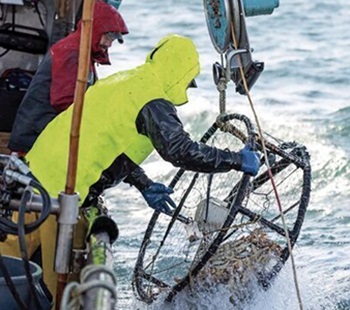 Oregon’s commercial Dungeness crab fishery opens Dec. 16 from Cape Falcon (Oswald State Park) to the California border. according to the Oregon Department of Fish and Wildlife (ODFW). “Pre-season testing in this area shows crab meat fill meets criteria and domoic acid is below the safety threshold,” a release from ODFW states. Oregon will open the north coast in coordination with southern Washington to ensure consumers get a quality product and crab is not wasted. Dec. 31 is the earliest this area could open. The commercial fleet can begin the presoak period – setting baited crab pots in the water – on Dec. 13 from Cape Falcon to the California border. more, >>CLICK TO READ<< 07:55
Oregon’s commercial Dungeness crab fishery opens Dec. 16 from Cape Falcon (Oswald State Park) to the California border. according to the Oregon Department of Fish and Wildlife (ODFW). “Pre-season testing in this area shows crab meat fill meets criteria and domoic acid is below the safety threshold,” a release from ODFW states. Oregon will open the north coast in coordination with southern Washington to ensure consumers get a quality product and crab is not wasted. Dec. 31 is the earliest this area could open. The commercial fleet can begin the presoak period – setting baited crab pots in the water – on Dec. 13 from Cape Falcon to the California border. more, >>CLICK TO READ<< 07:55
DFO to increase year-round lobster gear monitoring in Bay of Fundy
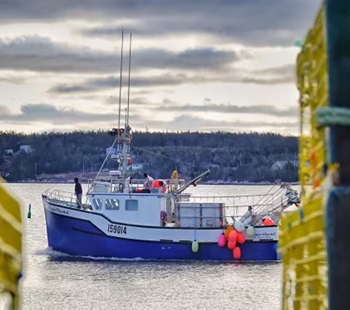 Enforcement officers with the federal Department of Fisheries and Oceans will soon have a new tool to lift, check and seize illegal lobster fishing gear from the waters between Nova Scotia and New Brunswick. The department is seeking a crew and vessel that would be contracted to take DFO officers on patrols to inspect fishing equipment. The patrol work isn’t new, but this contract represents an increase in surveillance and enforcement in an area where the fishing industry has called on officers to do more to deter illegal fishing operations. The contracted vessel would be responsible for patrolling throughout the Bay of Fundy and “be able to berth at various ports in New Brunswick and Nova Scotia,” according to the documents published online. more, >>CLICK TO READ<< 07:33
Enforcement officers with the federal Department of Fisheries and Oceans will soon have a new tool to lift, check and seize illegal lobster fishing gear from the waters between Nova Scotia and New Brunswick. The department is seeking a crew and vessel that would be contracted to take DFO officers on patrols to inspect fishing equipment. The patrol work isn’t new, but this contract represents an increase in surveillance and enforcement in an area where the fishing industry has called on officers to do more to deter illegal fishing operations. The contracted vessel would be responsible for patrolling throughout the Bay of Fundy and “be able to berth at various ports in New Brunswick and Nova Scotia,” according to the documents published online. more, >>CLICK TO READ<< 07:33
Vineyard Wind Withstands Another Legal Challenge
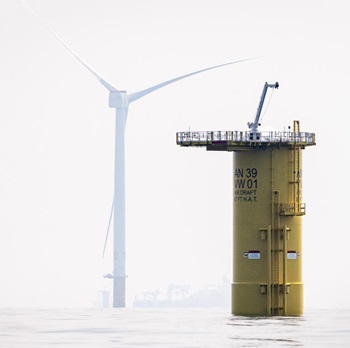 Another attempt to halt Vineyard Wind through the courts fell short last week when a federal court dismissed an appeal by a fishermen’s organization and a Rhode Island seafood dealer. A panel of judges with the U.S. First Circuit Court of Appeals upheld a lower court’s decision on Dec. 5, saying the group’s claims that the federal government mishandled the approval process for the wind farm were unfounded. The decision is one of several that Vineyard Wind, which aims to build 62 turbines to the south of the Island, has weathered in recent years, keeping the project’s approvals from the Bureau of Ocean Energy Management intact. Seafreeze Shoreside, a Rhode Island-based seafood dealer, the Long Island Commercial Fishing Association, the Responsible Offshore Development Alliance and other groups filed the appeal after their claims were rejected by the U.S. District Court in Boston in 2023. more, >>CLICK TO READ<< 12:47
Another attempt to halt Vineyard Wind through the courts fell short last week when a federal court dismissed an appeal by a fishermen’s organization and a Rhode Island seafood dealer. A panel of judges with the U.S. First Circuit Court of Appeals upheld a lower court’s decision on Dec. 5, saying the group’s claims that the federal government mishandled the approval process for the wind farm were unfounded. The decision is one of several that Vineyard Wind, which aims to build 62 turbines to the south of the Island, has weathered in recent years, keeping the project’s approvals from the Bureau of Ocean Energy Management intact. Seafreeze Shoreside, a Rhode Island-based seafood dealer, the Long Island Commercial Fishing Association, the Responsible Offshore Development Alliance and other groups filed the appeal after their claims were rejected by the U.S. District Court in Boston in 2023. more, >>CLICK TO READ<< 12:47
People who fish off P.E.I. have mixed reaction to new parental leave benefits
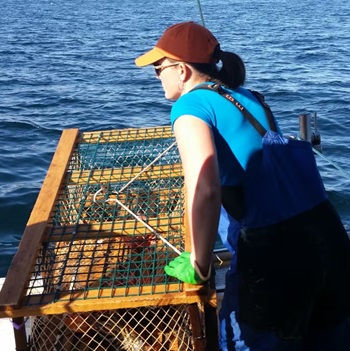 Some lobster fishing captains on Prince Edward Island say they think there will be little interest in new parental leave benefits just announced by the federal government. On Thursday, Ottawa announced maternity and parental benefits for people licensed to fish in Atlantic Canada, saying that could encourage the next generation of harvesters to join the fishing industry and provide more flexibility to those with new families. “I don’t think there’ll be a lot of uptake on it,” said lobster captain Charlie McGeoghegan, who fishes out of Pinette on P.E.I.’s south shore. “I haven’t heard anybody even ask for it, so I’m not sure where this came from.” Video, more, >>CLICK TO READ<< 07:26
Some lobster fishing captains on Prince Edward Island say they think there will be little interest in new parental leave benefits just announced by the federal government. On Thursday, Ottawa announced maternity and parental benefits for people licensed to fish in Atlantic Canada, saying that could encourage the next generation of harvesters to join the fishing industry and provide more flexibility to those with new families. “I don’t think there’ll be a lot of uptake on it,” said lobster captain Charlie McGeoghegan, who fishes out of Pinette on P.E.I.’s south shore. “I haven’t heard anybody even ask for it, so I’m not sure where this came from.” Video, more, >>CLICK TO READ<< 07:26
Shrimp sham: Investigation finds over 80% of “Gulf shrimp” sold on Mississippi Coast is imported
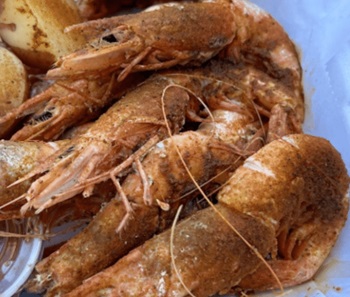 After Mississippi Gulf Coast staple restaurant Mary Mahoney’s Old French House came under fire for fraudulent branding of seafood, a new third-party investigation has found that mislabeling imported seafood is more rule than the exception for the region’s celebrated food scene. SeaD Consulting, a firm that specializes in genetic testing to monitor mislabeling and substitution fraud in the seafood industry, conducted a comprehensive investigation into the potential misrepresentation of shrimp served across coastal Mississippi. “Consumers come to the coast expecting the finest, freshest Gulf seafood, but what they’re being served often falls far short of that,” COO of SeaD Consulting Erin Williams said in a press release. “This isn’t just about mislabeling; it’s about eroding consumer trust, undercutting local business, and threatening the livelihood of hardworking Gulf shrimpers.” more, >>CLICK TO READ<< 10:56
After Mississippi Gulf Coast staple restaurant Mary Mahoney’s Old French House came under fire for fraudulent branding of seafood, a new third-party investigation has found that mislabeling imported seafood is more rule than the exception for the region’s celebrated food scene. SeaD Consulting, a firm that specializes in genetic testing to monitor mislabeling and substitution fraud in the seafood industry, conducted a comprehensive investigation into the potential misrepresentation of shrimp served across coastal Mississippi. “Consumers come to the coast expecting the finest, freshest Gulf seafood, but what they’re being served often falls far short of that,” COO of SeaD Consulting Erin Williams said in a press release. “This isn’t just about mislabeling; it’s about eroding consumer trust, undercutting local business, and threatening the livelihood of hardworking Gulf shrimpers.” more, >>CLICK TO READ<< 10:56Historic MS Coast boat is saved after captain’s death. His family has hopes for its future
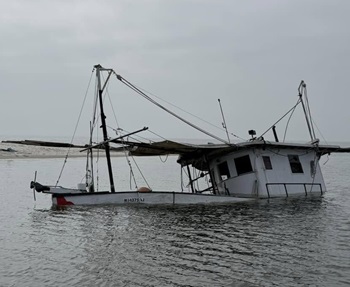 The Linda K sat for days near the shore of Deer Island, the water seeping in. It’s captain, esteemed shrimper Richard Kopszywa, died tragically last week after he went to work on the boat in the harbor. The 75-year-old devoted his days to restoring the historic vessel, and he never shrimped alone anymore, his family said. They do not know what happened. But through their grief, the Kopszywa family is determined to save the boat. One day, they hope to donate it to Biloxi’s Maritime and Seafood Industry Museum, where Kopszywa is in the Hall of Fame. “That’s the logical place,” said his wife, Shelley. “It has to go there.” lots of links, more, >>CLICK TO READ<< 06:48
The Linda K sat for days near the shore of Deer Island, the water seeping in. It’s captain, esteemed shrimper Richard Kopszywa, died tragically last week after he went to work on the boat in the harbor. The 75-year-old devoted his days to restoring the historic vessel, and he never shrimped alone anymore, his family said. They do not know what happened. But through their grief, the Kopszywa family is determined to save the boat. One day, they hope to donate it to Biloxi’s Maritime and Seafood Industry Museum, where Kopszywa is in the Hall of Fame. “That’s the logical place,” said his wife, Shelley. “It has to go there.” lots of links, more, >>CLICK TO READ<< 06:48
Capsized fishing boat off Alaska coast included Oregon crew member
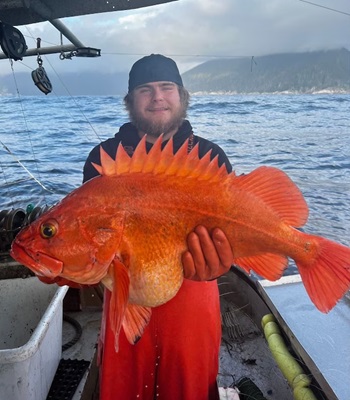 Before Jake Hannah, 22, left for his commercial fishing trip on Saturday night, he called his mother, who lives in his hometown of Coos Bay. “He said, ‘Hey mom, we’re getting ready to go out, I love you,’” That was our promise, “You always call me before you leave, and you always call me when you get home.” But the second call never came, she said. Instead, she learned her son’s boat, the F/V Wind Walker, had capsized in the stormy waters off the coast of Sitka, Alaska, with four other people on board. “I thought, ‘God please no, let these boys be safe,’” Carol Hannah said. “It wasn’t just Jake that I was worried about; it was the whole crew.” In his home state of Oregon, Jake Hannah continues to inspire people to remember who he was before he left for Alaska. “He was an all-around awesome guy; you couldn’t ask for a better friend,” Carol Hannah said. “He was the best son a mom could ever want.” Photos, more, >>CLICK TO READ<< 14:18
Before Jake Hannah, 22, left for his commercial fishing trip on Saturday night, he called his mother, who lives in his hometown of Coos Bay. “He said, ‘Hey mom, we’re getting ready to go out, I love you,’” That was our promise, “You always call me before you leave, and you always call me when you get home.” But the second call never came, she said. Instead, she learned her son’s boat, the F/V Wind Walker, had capsized in the stormy waters off the coast of Sitka, Alaska, with four other people on board. “I thought, ‘God please no, let these boys be safe,’” Carol Hannah said. “It wasn’t just Jake that I was worried about; it was the whole crew.” In his home state of Oregon, Jake Hannah continues to inspire people to remember who he was before he left for Alaska. “He was an all-around awesome guy; you couldn’t ask for a better friend,” Carol Hannah said. “He was the best son a mom could ever want.” Photos, more, >>CLICK TO READ<< 14:18
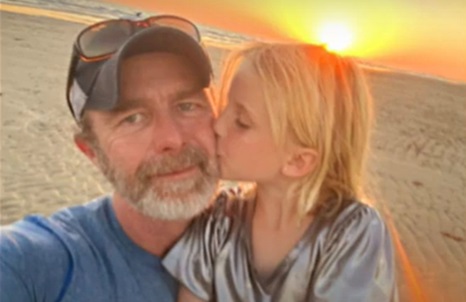
A Fundraiser in Support of F/V Wind Walker Capt. Travis Kapp’s family after tragedy
F/V Wind Walker – ‘Everybody is heartbroken’: Families of 5 missing crewmembers from boat capsizing share their stories
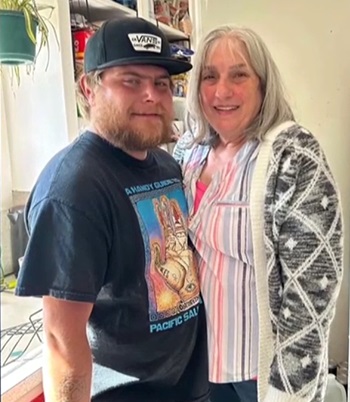 The families of the five crew members missing after their boat capsized in Icy Strait are opening up on who their loved ones are as they anxiously await updates while holding out hope that the men may still be alive somewhere. The U.S. Coast Guard suspended its search Monday after the fishing vessel Wind Walker capsized early Sunday near Point Couverden, the southern tip of a small island in Southeast Alaska. Always a lover of fishing and the ocean, Jacob’s mother Carol Hannah said he moved to Alaska from their home in Oregon roughly two years ago. She described her son as always being the life of the party who could light up a room with his larger-than-life personality. Only in Alaska for six months, 34-year-old Emilio “EJ” had only recently taken up a career in fishing, with this trip being his first time out on a boat, according to his aunt Stephanie Molt. She said the five men had been fishing for black cod before the vessel was reported to have capsized.Video, more, >>CLICK TO READ<< 07:47
The families of the five crew members missing after their boat capsized in Icy Strait are opening up on who their loved ones are as they anxiously await updates while holding out hope that the men may still be alive somewhere. The U.S. Coast Guard suspended its search Monday after the fishing vessel Wind Walker capsized early Sunday near Point Couverden, the southern tip of a small island in Southeast Alaska. Always a lover of fishing and the ocean, Jacob’s mother Carol Hannah said he moved to Alaska from their home in Oregon roughly two years ago. She described her son as always being the life of the party who could light up a room with his larger-than-life personality. Only in Alaska for six months, 34-year-old Emilio “EJ” had only recently taken up a career in fishing, with this trip being his first time out on a boat, according to his aunt Stephanie Molt. She said the five men had been fishing for black cod before the vessel was reported to have capsized.Video, more, >>CLICK TO READ<< 07:47
Gearing up: Crabbers get ready
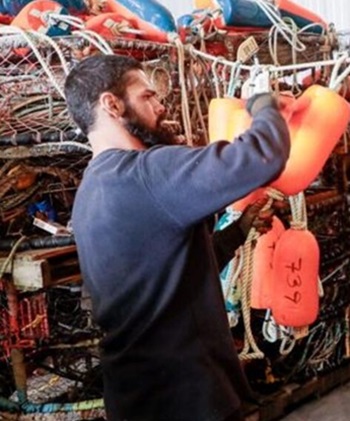 Crab pots are beginning to fill area ports, a sign that the state’s most lucrative commercial fishery is preparing for the season ahead. “We already have 200 staged down at the dock,” said commercial fisherman Florian Mumford, who will fish 600 pots this season total from the F/V Vengeance. Mumford was busy alongside crew Erik Ervest, Mark Hippensteel and Devlin Moline prepping pots Friday, Nov. 15, inside a covered building at the Ilwaco Boatyard. The official start of the 2024 Washington commercial Dungeness crab season could come as early as Dec. 1, if the crab pass preseason test fishery results for meat recovery and shell hardness. The tests are conducted in four rounds by WDFW, beginning in October and continuing through November in Washington, Oregon and California. The WDFW uses contracted coastal commercial crab vessels to conduct the test fishing. more, >>CLICK TO READ<< 06:39
Crab pots are beginning to fill area ports, a sign that the state’s most lucrative commercial fishery is preparing for the season ahead. “We already have 200 staged down at the dock,” said commercial fisherman Florian Mumford, who will fish 600 pots this season total from the F/V Vengeance. Mumford was busy alongside crew Erik Ervest, Mark Hippensteel and Devlin Moline prepping pots Friday, Nov. 15, inside a covered building at the Ilwaco Boatyard. The official start of the 2024 Washington commercial Dungeness crab season could come as early as Dec. 1, if the crab pass preseason test fishery results for meat recovery and shell hardness. The tests are conducted in four rounds by WDFW, beginning in October and continuing through November in Washington, Oregon and California. The WDFW uses contracted coastal commercial crab vessels to conduct the test fishing. more, >>CLICK TO READ<< 06:39
Missing crew from Alaska fishing boat identified
 The U.S. Coast Guard has released the names of the five fishermen who went missing off the southeast Alaska coast. This comes two days after the search for their bodies and the boat has been called off. Early Sunday morning, a few miles off the coast of Juneau, Alaska, the F/V Wind Walker crew came over the radio. Just twelve miles away on a tugboat, Glenn Jahnke was serving as a mate on watch overnight. He said he heard the fear and urgency in the crew’s voice. “He said they rolled on their side, were taking on water, two people were in the water. Then the Coast Guard asked a question and there was no response after that,” Jahnke said. That was the last time the five Sitka-based crew members were heard from. more, >>CLICK TO READ<< 14:54
The U.S. Coast Guard has released the names of the five fishermen who went missing off the southeast Alaska coast. This comes two days after the search for their bodies and the boat has been called off. Early Sunday morning, a few miles off the coast of Juneau, Alaska, the F/V Wind Walker crew came over the radio. Just twelve miles away on a tugboat, Glenn Jahnke was serving as a mate on watch overnight. He said he heard the fear and urgency in the crew’s voice. “He said they rolled on their side, were taking on water, two people were in the water. Then the Coast Guard asked a question and there was no response after that,” Jahnke said. That was the last time the five Sitka-based crew members were heard from. more, >>CLICK TO READ<< 14:54
First Circuit likely to save the whales despite lobstermen’s complaints
 An epic sea battle unfolded at the First Circuit Tuesday as Massachusetts fishermen tried to harpoon federal regulations that protect the North Atlantic right whale. But it appeared the judges were on the whales’ side and, as in “Moby Dick,” the fishermen may end up shipwrecked. At issue is a federal rule that limits lobster and Jonah crab fisheries’ use of buoy lines, which can entangle and kill whales. The fishermen’s lawyer, Daniel Cragg, told the judges that the rule resulted from Congress making a “drafting failure,” but the judges seemed incredulous. more, >>CLICK TO READ<< 10:52
An epic sea battle unfolded at the First Circuit Tuesday as Massachusetts fishermen tried to harpoon federal regulations that protect the North Atlantic right whale. But it appeared the judges were on the whales’ side and, as in “Moby Dick,” the fishermen may end up shipwrecked. At issue is a federal rule that limits lobster and Jonah crab fisheries’ use of buoy lines, which can entangle and kill whales. The fishermen’s lawyer, Daniel Cragg, told the judges that the rule resulted from Congress making a “drafting failure,” but the judges seemed incredulous. more, >>CLICK TO READ<< 10:52
Crabby start to southwestern N.S. lobster season
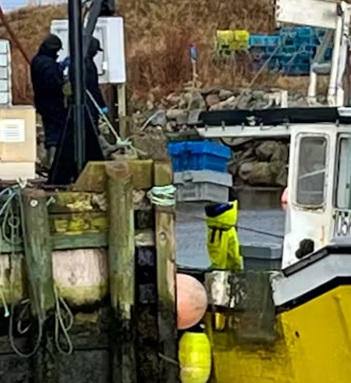 Jonah crabs instead of lobster have been filling traps set by many southwestern Nova Scotia lobster fishermen fishing in lobster fishing area 34 the first week of the season. “Across the board, we’re hearing a massive biomass of female Jonah crab right now is loading up a lot of the traps, which is a pain for the crew,” says Heather Mulock, executive director of the Coldwater Lobster Association. “It’s always discouraging to see traps full of something you don’t want. One of the biggest concerns this year is the amount of crab.” Mulock said it’s not unusual for crews to have some crabs in their traps, but this year is different. “I’ve talked with enough fishermen, some who have been fishing 30 or 40 years, and they have never seen this much crab in their entire fishing career, so things are changing. Hopefully, this is another anomaly for LFA 34,” she said. more, >>CLICK TO READ<< 11:31
Jonah crabs instead of lobster have been filling traps set by many southwestern Nova Scotia lobster fishermen fishing in lobster fishing area 34 the first week of the season. “Across the board, we’re hearing a massive biomass of female Jonah crab right now is loading up a lot of the traps, which is a pain for the crew,” says Heather Mulock, executive director of the Coldwater Lobster Association. “It’s always discouraging to see traps full of something you don’t want. One of the biggest concerns this year is the amount of crab.” Mulock said it’s not unusual for crews to have some crabs in their traps, but this year is different. “I’ve talked with enough fishermen, some who have been fishing 30 or 40 years, and they have never seen this much crab in their entire fishing career, so things are changing. Hopefully, this is another anomaly for LFA 34,” she said. more, >>CLICK TO READ<< 11:31
Louisiana Shrimpers face crisis as cheap imports threaten $1.3 billion industry
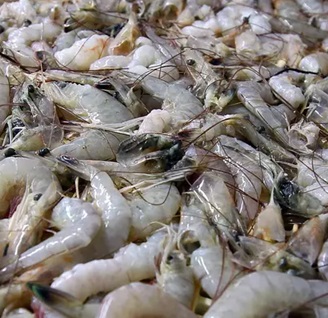 Louisiana’s shrimp industry, an essential part of the state’s economy and cultural identity, is under serious threat. A flood of cheap imported shrimp is driving prices to record lows, leaving local shrimpers fighting to survive. Without swift action, this generations-old way of life could vanish, taking with it jobs, traditions, and a vital piece of Louisiana’s coastal economy. Family-owned shrimping businesses, often passed down through generations, are struggling to stay afloat. The combination of plummeting prices and rising costs is forcing many to consider leaving the industry altogether. The potential collapse of the shrimping industry would devastate coastal towns like Grand Isle, Delcambre, and Pointe à la Hache, where much of the local economy depends on shrimping.
Louisiana’s shrimp industry, an essential part of the state’s economy and cultural identity, is under serious threat. A flood of cheap imported shrimp is driving prices to record lows, leaving local shrimpers fighting to survive. Without swift action, this generations-old way of life could vanish, taking with it jobs, traditions, and a vital piece of Louisiana’s coastal economy. Family-owned shrimping businesses, often passed down through generations, are struggling to stay afloat. The combination of plummeting prices and rising costs is forcing many to consider leaving the industry altogether. The potential collapse of the shrimping industry would devastate coastal towns like Grand Isle, Delcambre, and Pointe à la Hache, where much of the local economy depends on shrimping.
more,>>CLICK TO READ<< 08:52
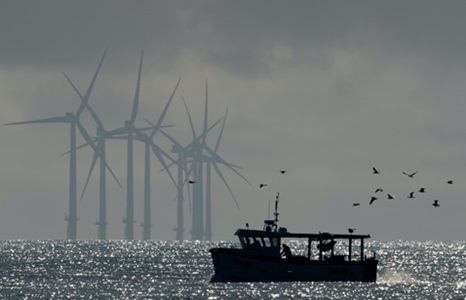
Offshore industry hails LED scallop fishing drive
The Offshore Wind Industry Council has welcomed plans to fund a new environmentally friendly method of catching scallops – using underwater LED lights. It is one of five projects announced by the Offshore Wind Evidence and Change Programme (OWEC) as part of its 2024 funding round, and the aim is to enable more diversified fishing around offshore wind farms. The 18-month project will explore ways to co-locate scallop fisheries and offshore wind farms together, using alternative fishing methods to the traditional practice of dredging along the seabed which disturbs marine habitats and species. These will now be rolled out at a regional level by fishing crews in Scarborough, Bridlington and Whitby who fish around and within offshore windfarms. more, >>CLICK TO READ<< 07:20
Fisheries Officers Strike Over Safety Concerns
 Fisheries Officers across NSW have begun industrial action over safety concerns after a number of violent incidents where they were shot at, threatened with knives and baseball bats and had cars driven at them. The Officers are demanding they’re issued with protective equipment like stab-proof vests and capsicum spray. Fisheries Officers are now avoiding certain areas and individuals at the very time fears have emerged that crooks, poachers and organised criminals like outlaw bikie gangs have taken over the state’s rivers, oceans and estuaries and are now plundering valuable species like abalone and rock lobster. Without direct Police assistance on operations the Officers are now refusing to complete inspections of commercial trawlers at nighttime. The Department of Primary Industries, which employs Fisheries Officers, attempted to force them back into dangerous night work earlier this week by applying to the NSW Industrial Relations Commission but the Commission refused to make such an order. more, >>CLICK TO READ<< 12:38
Fisheries Officers across NSW have begun industrial action over safety concerns after a number of violent incidents where they were shot at, threatened with knives and baseball bats and had cars driven at them. The Officers are demanding they’re issued with protective equipment like stab-proof vests and capsicum spray. Fisheries Officers are now avoiding certain areas and individuals at the very time fears have emerged that crooks, poachers and organised criminals like outlaw bikie gangs have taken over the state’s rivers, oceans and estuaries and are now plundering valuable species like abalone and rock lobster. Without direct Police assistance on operations the Officers are now refusing to complete inspections of commercial trawlers at nighttime. The Department of Primary Industries, which employs Fisheries Officers, attempted to force them back into dangerous night work earlier this week by applying to the NSW Industrial Relations Commission but the Commission refused to make such an order. more, >>CLICK TO READ<< 12:38






